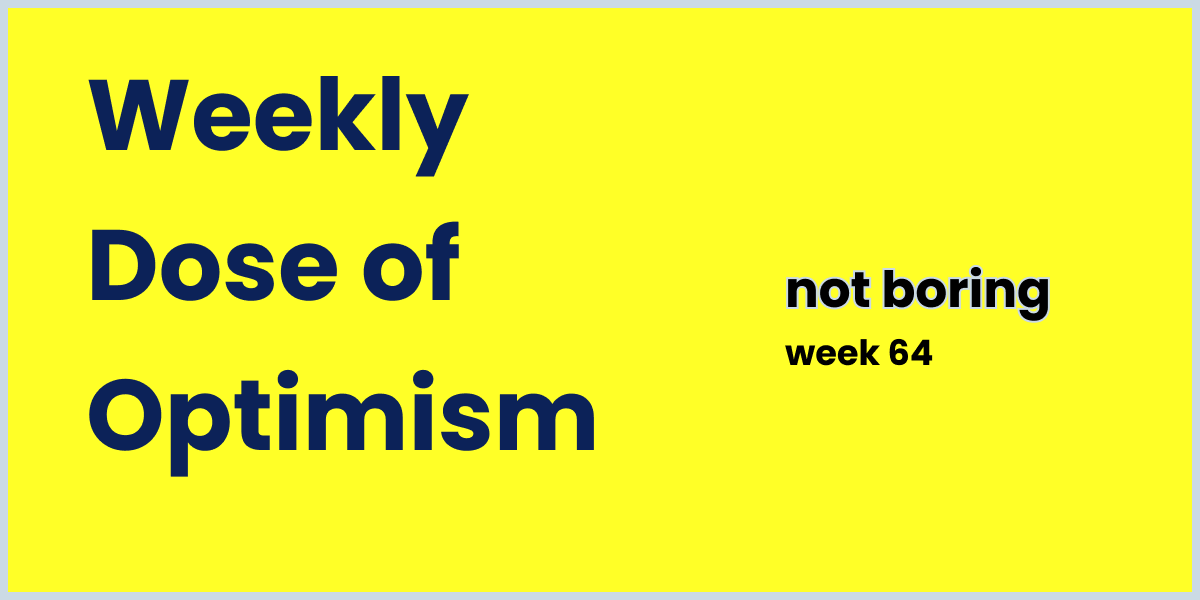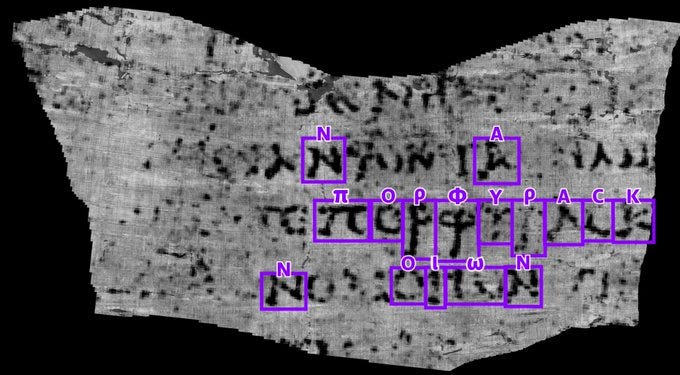

Weekly Dose of Optimism #64
source link: https://www.notboring.co/p/weekly-dose-of-optimism-64
Go to the source link to view the article. You can view the picture content, updated content and better typesetting reading experience. If the link is broken, please click the button below to view the snapshot at that time.

Weekly Dose of Optimism #64
Age of Miracles, Solar Resolution, Sturgeon, Purple Cloth, Charles Feeney, Loom
Hi friends 👋,
Happy Friday and welcome back to our 64th Weekly Dose of Optimism.
This was a tough week to be optimistic. Last Saturday, Hamas terrorists brutally murdered, raped, and kidnapped over a thousand Israeli civilians, including kids and babies. The week since has been a parade of gut-wrenching image after gut-wrenching image. It’s impossible to imagine the pain families are going through, and impossible to believe that this is millions’ of humans’ lived reality right now.
Our hearts go out to the people of Israel, Jews across the world, and the innocent people throughout the region, including Palestinians, who will suffer as a result of these acts of terror.
This week’s tragedies are a reminder that there is evil in the world. But there’s more goodness, as exemplified by the stories of heroism that keep emerging.
Every week, we try to share a little human goodness, and we’ll do the same this week.
Let’s get to it.
(1) Introducing Age of Miracles
Packy here. I’ve been cooking something up over the past few months with the team at Turpentine, and I’m excited to finally get to share a little sneak peek with you.
Age of Miracles is a podcast about the industries helping to create a world of superabundance. Each season, over the course of ten jam-packed episodes, we’re going to go deep on one industry by talking to founders, investors, researchers, policy experts, and even skeptics to understand the challenges and opportunities at play.
Then we’re going to weave all of the conversations into a narrative that we hope can serve as the best way to get up to speed on that industry — its history, dynamics, a snapshot of the current state, and some dreaming about what happens if things go right.
The title Age of Miracles is a little tongue-in-cheek. I strongly believe that we can live in an Age of Miracles, but I’m also aware that it’s going to take more than technological innovation to get there. So we explore all of the nitty-gritty, from policy to economics to culture to, of course, entrepreneurship, that’s required for a technology to have a real positive impact on billions of lives. I hope we come out the other side with a more deeply-earned optimism.
For our first season, we’re starting at the foundation: energy, specifically nuclear and fusion energy.
We’re unabashedly techno-optimists. More energy means more growth, and growth is good. But we’re realists, too. More energy is great. How do we get there?
It’s easy to say, “BUILD MORE NUCLEAR.” Being pro-nuclear is an obvious position to hold in tech at this point. But we’ve had nuclear reactors for seven decades, and its growth has stagnated in the West. Figuring out how to build more nuclear, how to make it cheap enough that the market demands it, is the tricky part. That’s exactly what we’ll cover.
We’ll also hear from people who are working to create energy abundance through other sources, like solar, wind, synthetic fuels, and even fossil fuels.
And then, in the second half of the season, we’ll turn our attention to the future energy source people are most excited by: fusion.
I’m not an expert in these topics. I’m here to learn as we go. But having someone who knows where to look and who to talk to and how to contextualize everything is key. So each season, I’m teaming up with a co-host who actually knows what they’re talking about in the space, and for Season 1, I’m thrilled to co-host withJulia DeWahl.
Julia was an early employee at Opendoor, worked on Starlink at SpaceX, and is now on the founding team at a nuclear startup, Antares. Her piece, Nuclear energy: past, present, and future, is the resource I leaned on most heavily when I was getting up to speed on nuclear.
We’re launching the first two episodes on October 27th. Getting early momentum helps a ton — we’d love to get featured by Apple and Spotify so we can reach a wider audience — so I would really appreciate it if you subscribed wherever you listen to podcasts. We’ve put a ton of work into this and I hope you enjoy and learn as much as I have!
Of course, I’ll still be in your inbox every Tuesday and Friday, and I hope that the podcast makes my writing better by helping me understand the nuance behind the breakthroughs.
(2) Terraform Industries Produces Methane from CO2 and Sunlight
Age of Miracles’ first season focuses on nuclear fission and fusion power because they represent the biggest delta between potential and reality in energy. But really, we just want much, much more energy — solar, wind, geothermal, synthetic fuels, gas. Energy is prosperity.
One of the guests we had on the podcast to discuss other energy sources — specifically solar and synthetic fuels — was Casey Handmer, the founder and CEO of Terraform Industries. Terraform’s plan is to make cheap hydrocarbons from CO2 direct air capture and sunlight. In other words, use solar energy to pull carbon from the sky, run it through an electrolyzer, and spit out carbon neutral gas on the other side.
Yesterday, for the first time, they did it.
Terraform has been one of my favorite companies for a while — I’ve mentioned it a few times in Not Boring — because it uses solar, which is basically just good for electricity generation, to make fuels that can be used to power a bunch of the things that use fuel today, like planes and ships. They’re starting with methane, but with a little extra ingenuity, can make any hydrocarbon, including oil. Great step in that direction.
And in his free time, Casey also netted a prize for helping discover the first word as part of the Vesuvius Challenge…
(3) First word discovered in unopened Herculaneum scroll by 21yo computer science student
From Scroll Prize
That is until Luke Farritor, a contestant of the Vesuvius Challenge, became the first person in two millennia to see an entire word from within an unopened scroll this August. For that, we are thrilled to award Luke a $40,000 First Letters Prize, which required contestants to find at least 10 letters in a 4 cm2 area in a scroll.
We covered the Vesuvius Challenge launch in March 2023 in the Weekly Dose, and just 7 months later the Nat Friedman-backed competition is awarding its first prize for the discovery of “the first word.” Let’s take a step back, here’s what we wrote about the challenge at the time:
About 300 years ago, we discovered ancient scrolls (Herculaneum Papyri) from the library of Julius Ceasar’s father-in-law’s villa (79 AD). The scrolls were carbonized by volcanic heat, but preserved. They’re currently too delicate to unroll, but if we were able to read them it would double the corpus of literature we have from antiquity.
A team of researchers recently developed a method called “virtual unwrapping” that digitally unrolls and reads the scroll without physically opening it.
Now, a team led by Nat Friedman and Daniel Gross open sourcing the challenge to read the Herculaneum Papyri. After 275 years, the ancient puzzle of the Herculaneum Papyri has been reduced to a software problem.
Well, it looks like that software problem is starting to get solved. Luke Farritor, a 21-year old computer scientist built on work from Casey Handmer to identify the first word in the Herculaneum scrolls. The first word is…drumroll please…
"πορφυρας" which means "purple dye" or "cloths of purple." OK OK, a bit anticlimactic. No secrets of the ancient world revealed (other than maybe a proclivity for purple clothing) yet. But we’re early, and now we’re making real progress. Our bet is that this thing will be fully decoded in the next year.
(4) Ultra-fast deep-learned CNS tumour classification during surgery
C. Vermeulen, M. Pagès-Gallego for Nature
We conclude that machine-learned diagnosis based on low-cost intraoperative sequencing can assist neurosurgical decision-making, potentially preventing neurological comorbidity and avoiding additional surgeries.
Central nervous system (CNS) tumors are among the most lethal cancers, especially in children, and their treatment requires a balance between thorough removal and preserving neurological function. It’s a tight rope. Accurate pre-surgical diagnosis is crucial to inform surgical strategy, but current methods based on pre-operative imaging and intra-operative analysis can sometimes be inconclusive. Essentially, surgeons have a plan until they get punched in the face with new information mid-surgery.
These researchers developed "Sturgeon," an AI that rapidly classifies CNS tumors during surgery. Within 90 minutes, Sturgeon accurately diagnosed 45 out of 50 samples in retrospective tests and demonstrated its real-time applicability in 25 surgeries, suggesting potential for better-informed intraoperative decisions.
AI as a co-pilot seems to be the first big use-case of the AI revolution. Help lawyers redline contracts. Help engineers write code and debug. And, with Sturgeon, help doctors perform more accurate real-time diagnoses during surgery.
(5) Charles Feeney, philanthropist who gave away his billions, dies at 92
Brian Murphy for The Washington Post
He decided to give nearly all of it away — close to $8 billion — donation by donation, charity by charity, year after year.
You’ve probably never heard of Charles Feeney. And that is by design. Thepioneer of duty-free shops and a tech investor, Feeney gave away his $8 billion fortune over the last decades of his life, and he did so quietly, taking pains to conceal the identity behind his donations. Warren Buffett once presented an award to Feeney calling him “my hero and Bill Gates’s hero — he should be everybody’s hero.”
There’s nothing wrong with seeking notoriety in philanthropy. It’s certainly true that people give, in part, to make themselves feel good. And hey, if that’s the case, then we should lean into that and make people feel good when they give. But there is something special about Feeney’s approach to philanthropy. Amass a fortune, give it all away during your lifetime, live a modest life, and do it all in relative secret. The world would certainly be a better, more optimistic place if we had more Charles Feeneys.
Bonus: Congrats to Loom on its $975 million sale to Atlassian 🥳
Packy here. Yesterday, Atlassian announced that it’s acquiring async video company Loom for $975 million, in cash, in this economy.
Normally, we don’t cover M&A activity in the Weekly Dose, and Loom isn’t a portfolio company. So why are we including this one?
Because this was TechCrunch’s coverage of the deal:
When I wrote Optimism last summer, one of the motivating factors was just how negative the media coverage of tech is. It’s why we started the Weekly Dose, as a little counterbalance. This TC article is a good example of the snarky attitude towards tech that’s all too common. The sarcasm oozes off the page.
So let me just say: if Not Boring ever sells for $975 million in cash, cleanly clearing the pref stack and making me and many of my employees generationally wealthy, I too will put a positive spin on the acquisition. Big congrats to the Loom team on a great outcome after nearly a decade’s worth of hard work.
That’s all for this week. We’ll be back in your inbox on Tuesday.
Thanks for reading,
Dan + Packy
Recommend
About Joyk
Aggregate valuable and interesting links.
Joyk means Joy of geeK






